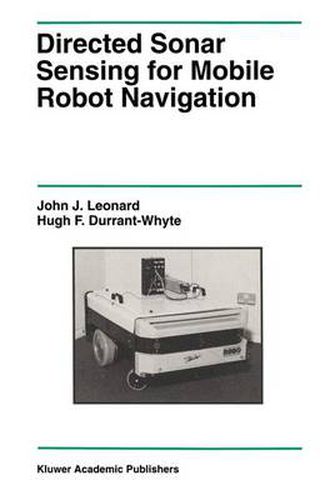Readings Newsletter
Become a Readings Member to make your shopping experience even easier.
Sign in or sign up for free!
You’re not far away from qualifying for FREE standard shipping within Australia
You’ve qualified for FREE standard shipping within Australia
The cart is loading…






This title is printed to order. This book may have been self-published. If so, we cannot guarantee the quality of the content. In the main most books will have gone through the editing process however some may not. We therefore suggest that you be aware of this before ordering this book. If in doubt check either the author or publisher’s details as we are unable to accept any returns unless they are faulty. Please contact us if you have any questions.
While many mobile robots come equipped with ultrasonic range sensing (sonar), accurate map building and position estimation using sonar has been elusive because of the difficulty in interpreting sonar data correctly. This book presents evidence that sonar can in fact fulfil the perception role for the provision of long-term autonomous navigation in a broad class of man-made environments. A new approach to mobile robot navigation is presented that unifies the problems of localization, obstacle detection and map building in a combined multi-target tracking framework. The primary tools of this approach are the Kalman filter and a physically based sonar sensing model. Experimental results with real sonar data demonstrate model-based localization using an a-priori hand-measured map and sub-centimetre accuracy map building for an uncluttered office scene. This book shoud be of particular interest to researchers on mobile robotics, especially potential users of sonar. The approach has greater significance, however, as the issues involved - the choice of representation, the problem of data association and the pursuit of long-tem autonomy - are central to many outstanding problems in robotics and artificial intelligence.
$9.00 standard shipping within Australia
FREE standard shipping within Australia for orders over $100.00
Express & International shipping calculated at checkout
Stock availability can be subject to change without notice. We recommend calling the shop or contacting our online team to check availability of low stock items. Please see our Shopping Online page for more details.
This title is printed to order. This book may have been self-published. If so, we cannot guarantee the quality of the content. In the main most books will have gone through the editing process however some may not. We therefore suggest that you be aware of this before ordering this book. If in doubt check either the author or publisher’s details as we are unable to accept any returns unless they are faulty. Please contact us if you have any questions.
While many mobile robots come equipped with ultrasonic range sensing (sonar), accurate map building and position estimation using sonar has been elusive because of the difficulty in interpreting sonar data correctly. This book presents evidence that sonar can in fact fulfil the perception role for the provision of long-term autonomous navigation in a broad class of man-made environments. A new approach to mobile robot navigation is presented that unifies the problems of localization, obstacle detection and map building in a combined multi-target tracking framework. The primary tools of this approach are the Kalman filter and a physically based sonar sensing model. Experimental results with real sonar data demonstrate model-based localization using an a-priori hand-measured map and sub-centimetre accuracy map building for an uncluttered office scene. This book shoud be of particular interest to researchers on mobile robotics, especially potential users of sonar. The approach has greater significance, however, as the issues involved - the choice of representation, the problem of data association and the pursuit of long-tem autonomy - are central to many outstanding problems in robotics and artificial intelligence.